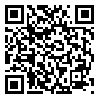BibTeX | RIS | EndNote | Medlars | ProCite | Reference Manager | RefWorks
Send citation to:
URL: http://rph.khu.ac.ir/article-1-2615-en.html
This study aimed at predicting the tendency to drug abuse based on personality traits, alexithymia, attachment styles and behavioral inhibition/activation systems. In
a sample of 345 students, selected from the students of Islamic Azad University of Andimeshk, khozestan through stage random sampling method, the model for the path of drug abuse was investigated. Then each subject was asked to complete five questionnaires including PS (APS), behavioral inhibition and activation system scale (BIS/BAS), short form NEO Personality Inventory (NEOPI- FF) ,Toronto Alexithymia Scale(TAS-20) attachment adult scale(RASS).The results showed that the predicting capacity of inhibition /activation system changed when the mediating variables were included.This indicated the mediating role of neuroticism, extraversion, agreeability, responsibility and avoidance/ ambivalence attachment styles and alexithymia in the behavioral
inhibition/activation systems and tendency to drug abuse. Behavioral activation system lead to the reduction of the tendency to drug abuse and behavioral inhibition system lead to the increase of the tendency to drug abuse. Neuroticism and ambivalent/avoidance attachment style, and alexithymia were the mechanisms reducing or increasing the effect of behavioral inhibition/activation systems on the tendency to drug abuse.
Received: 2016/06/18 | Accepted: 2016/06/18 | Published: 2016/06/18
| Rights and permissions | |
 | This work is licensed under a Creative Commons Attribution-NonCommercial 4.0 International License. |




